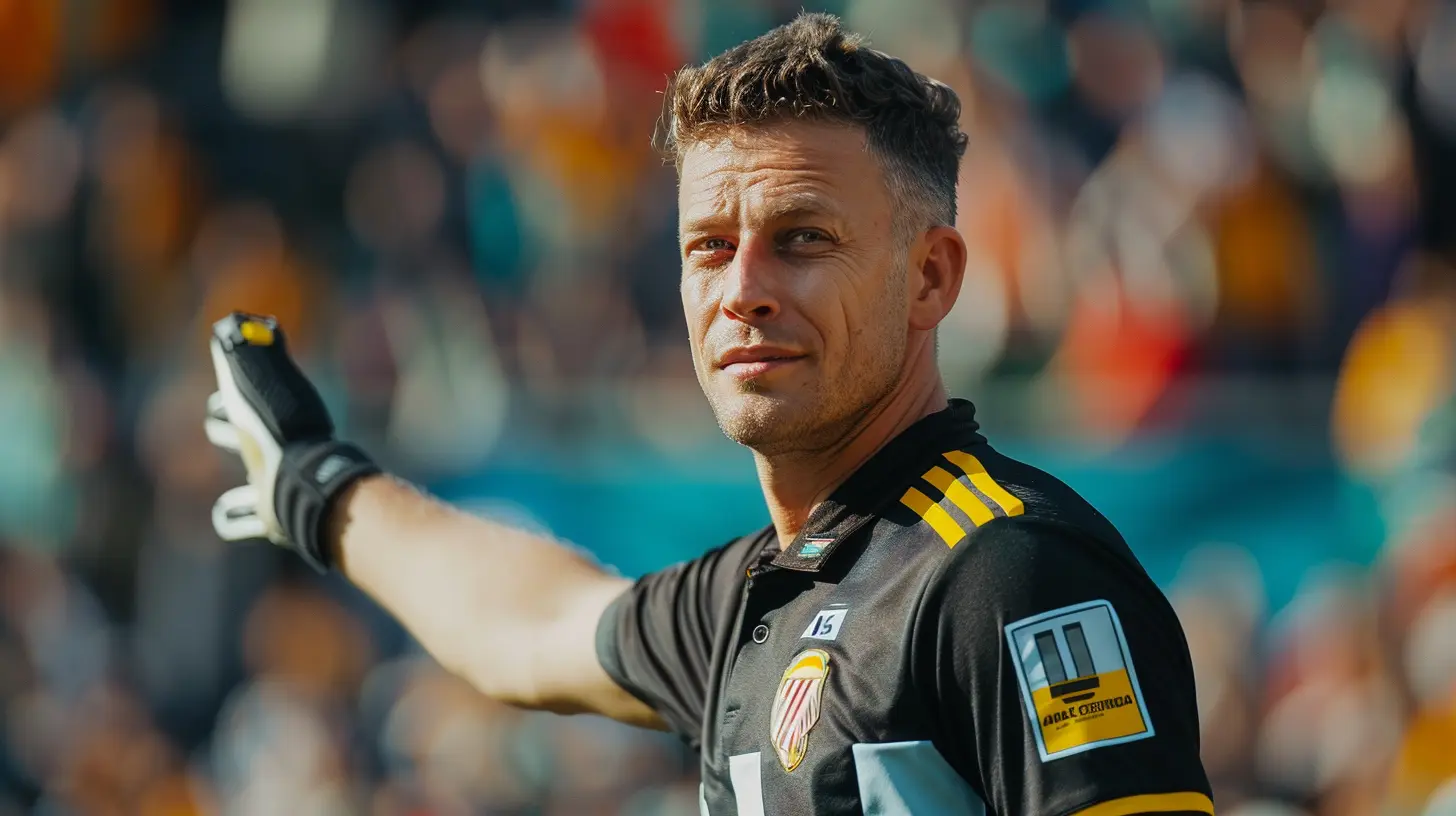The Importance of Communication for Referees on the Field
19 June 2025
Let’s be honest—when we think about referees in sports, we often picture them blowing whistles, flashing red cards, or getting booed by fans (sometimes unfairly). But what we tend to forget is that referees are not just rule enforcers—they’re skilled communicators managing chaos in real-time.
Imagine trying to control a fast-paced soccer game or high-pressure basketball match without saying a word. Sounds impossible, right? That’s because communication is the secret sauce behind a well-officiated match. Whether it’s subtle hand gestures, firm calls, or quick chats with players, the way referees communicate can make or break the flow of the game.
Let’s dive into why communication is absolutely critical for referees on the field, and how it shapes the game from kickoff to the final whistle.
Why Communication Matters More Than We Think
Referees aren’t just the folks in black and white or neon green shirts—they're the glue holding the game together. Ever wonder how 22 soccer players, two coaches, a few assistants, and thousands of fans can stay (mostly) sane over 90 minutes? Communication. It's what keeps the game understandable, fair, and safe.Great referees don’t just know the rules—they explain them, enforce them with clarity, and navigate those tense moments between competitive athletes with words, body language, and signals.
Without good communication, referees can lose control of the match. Players get confused. Coaches lose their minds. And worst of all? The fans feel the chaos.
Verbal vs Non-Verbal Communication: A Dual Arsenal
Let’s break it down. Referees have two major forms of communication on the field:1. Verbal Communication
This includes:- Calling out fouls clearly
- Giving warnings to players
- Explaining decisions to captains or coaches
- Using their tone to control tense situations
Think of these like the referee's microphone—even if there isn’t literally one on the field. How they say things matters just as much as what they say.
A simple “Watch your hands!” in a basketball game might prevent the next foul. Or a calm but firm “That’s enough” can stop an argument from spiraling into a brawl. It’s subtle, but it’s crucial.
2. Non-Verbal Communication
Now this is where things get interesting. Referees rely heavily on visual cues:- Hand signals
- Whistle tones (sharp vs. long)
- Eye contact
- Body posture
Sometimes a raised eyebrow or a silent gesture speaks volumes. It's like learning a whole new language—and the players understand it too.
Ever watched a referee jog over with purpose, give a quick hand motion, and immediately everyone calms down? That’s non-verbal communication magic.
Building Trust with Players
Here’s something that might surprise you—players don’t always hate referees. In fact, when refs communicate well, they often earn the players’ respect.Players want consistency. They want to understand why a foul was called. They don’t want to be left guessing. When a referee takes a few seconds to explain a decision (especially a controversial one), it changes everything.
Think of it like a good teacher-student relationship. You don’t just bark orders. You share clarity. You build trust. Over time, players start to respect your judgment—even if they don’t always agree.
Diffusing Tension with Words
Sports are emotional. Tempers flair. And sometimes, all it takes is a wrong word or gesture to send things spiraling.This is where referees shine—or struggle.
A skilled referee knows how to defuse tension before it explodes. How? Let’s say two players are getting chippy. A quick word like, “Hey, calm down—you’re both important to your team,” can reset the mood. It’s disarming. It reminds them why they’re there.
Don’t underestimate the power of tone either. A calm, confident voice can bring the whole stadium down a notch. It’s like a coach’s halftime speech but compressed into five seconds.
Communication Creates Flow
Nobody likes a game that stops every two minutes. When referees communicate well, the game flows. Players know when they can be aggressive and when to pull back. Coaches understand the line.Good communication works like traffic lights at a busy intersection. Everything keeps moving because everyone knows what to expect. Without it? Chaos.
Referees who talk to players, use clear signals, and manage their tone keep the momentum up. And that’s what fans came to watch—a game, not a stop-and-go traffic jam.
Handling Controversial Calls
Let’s not sugarcoat it—referees will always get heat for controversial calls. It’s part of the gig. But strong communication can soften the blow.When a ref explains WHY a penalty was awarded rather than just pointing to the spot and walking off, it helps. Even a short explanation to the captain like, “He tripped him inside the box—clear contact,” can ease protests.
It won’t stop the boos, but it does something bigger—it protects the referee’s credibility. And credibility is gold in officiating.
Teamwork with Assistant Referees
Referees don’t work solo. There’s a whole crew: assistant referees, fourth officials, sometimes even Video Assistant Referees (VAR). These folks need to be on the same page.Excellent communication between these officials is vital. Picture this: a linesman flags for offside, but the center ref doesn’t notice. If they don’t communicate quickly and clearly—boom—major confusion ensues.
Referees often use headsets, hand signals, and even pre-game meetings to get their signals aligned. Each member needs to speak the same "ref language."
Great communication among officials looks seamless to fans—but behind the scenes, it’s nonstop talk, eyes, and signals.
Adapting Communication Across Different Sports
Sure, the basics of communication stay the same, but every sport has its own rhythm and culture. The way a referee communicates in a rugby match is different from a hockey game.In rugby, for instance, referees give running commentary. They talk through decisions with the players in real-time, often using first names. In contrast, football refs rely more on short verbal blasts and sharp whistles.
Knowing the game's culture helps referees adapt their voice, tone, and gestures accordingly. That’s what separates good referees from great ones—they're like communication chameleons.
Training and Preparation: Communication Doesn’t Come Naturally
Let’s bust a myth—referees aren’t born great communicators. They train for it. A lot.Officiating organizations run workshops on communication. Referees watch footage of themselves, analyze body language, and practice phrasing. They even role-play heated match situations.
Referees also build mental toughness because communicating under pressure is no joke. Imagine trying to keep your voice calm while 50,000 people scream that you're blind.
It takes focus, patience, humility, and a thick skin… and loads of practice.
The Human Side: Confidence Without Ego
Let’s get real—communication isn’t just about talking. It’s also about attitude.Nobody likes a referee with a swollen ego or one who barks at players like a drill sergeant. The best ones strike a balance between confidence and humility.
They speak with authority but not arrogance. They listen when needed. They explain without condescending. It’s about being in control without being controlling.
Players pick up on that. Coaches do too. And it changes the whole atmosphere of the game.
The Takeaway: Good Refs Talk, Great Refs Connect
Communication is the bridge between chaos and control in sports. It’s not just about calling fouls or handing out cards. It’s about reading people, managing emotions, and building trust—all in real time, with thousands of eyes watching.So, the next time you see a referee have a quick word with a frustrated striker or explain a call to a fuming coach, remember—those little moments are game-changing.
The importance of communication for referees on the field? It’s not just important—it’s everything.
Final Thoughts
Referees carry a heavy load. They’re fairness watchdogs, peacekeepers, and crisis managers—all in one. And while rules are the backbone of any game, communication is the heartbeat.You can have the best rulebook in the world, but without a human voice guiding the game, things fall apart fast. So here’s to the unsung communicators on the field—the referees who don’t just blow whistles, but speak volumes.
Next time you watch a game, pay attention to the referee’s words, gestures, and expressions. Chances are, those small actions are doing more to shape the game than you realize.
all images in this post were generated using AI tools
Category:
RefereeingAuthor:

Umberto Flores
Discussion
rate this article
3 comments
Edward Strickland
Great insights! Effective communication is indeed crucial for referees to maintain control and fairness in a game. Enhancing their collaboration with players and officials can significantly improve match dynamics.
June 22, 2025 at 4:52 AM

Umberto Flores
Thank you! I completely agree—strong communication enhances not just control, but also fosters respect and understanding among all participants in the game.
Chelsea Edwards
In the chaotic dance of the game, the whispers between referees often hold the key to its outcome. Hidden signals and unspoken bonds weave a tapestry of authority and trust. What unseen dynamics shape their calls? Delve into the silent symphony of the field where every word can alter fate.
June 21, 2025 at 4:03 AM

Umberto Flores
Absolutely! Effective communication among referees is crucial, as it fosters trust and clarity, ultimately influencing game outcomes. Understanding these dynamics is key to appreciating the intricacies of officiating.
Dax Foster
Communication for referees is crucial—after all, yelling ‘Foul!’ might just confuse the players. Imagine the chaos if they didn’t use hand signals: ‘Is that a penalty or just a really enthusiastic dance move? Let’s clear that up!’
June 19, 2025 at 3:31 AM

Umberto Flores
Absolutely! Clear communication is essential for referees to ensure players understand decisions and maintain order on the field. Without it, confusion and chaos could easily ensue!



